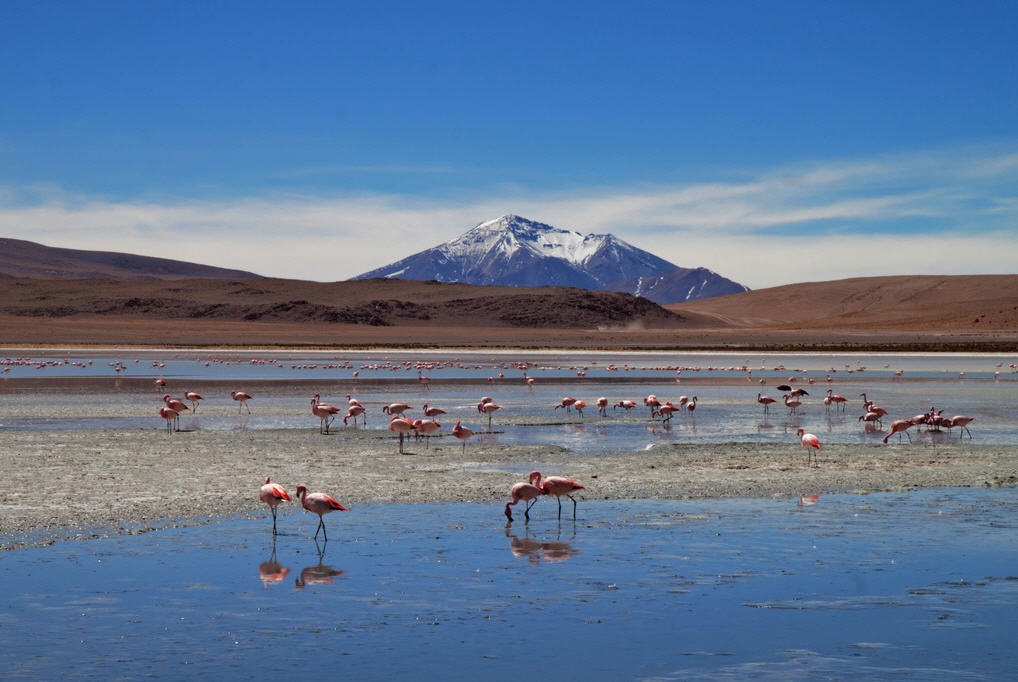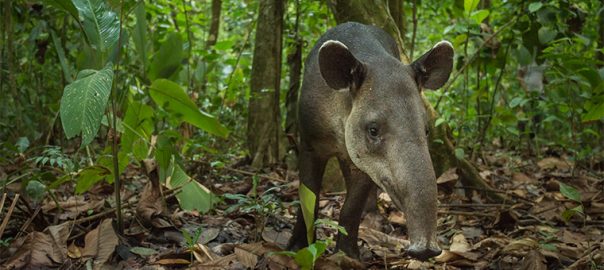Category: Costa Rica
Weekly digest: An in-depth look at Belo Monte dam, the threat of a fungus on Latin America’s bananas and exporting the Galapagos model to Chile.
BRAZIL In mid-2011, construction started on Brazil’s Belo Monte hydroelectric dam on a southeast tributary of the Amazon started and by early 2015 should supply 18 million people with its 11,200 MW capacity. Of course, that’s when the Xingu river is flowing at full strength. The average capacity will generate 4,500 MW. Folha de Sao … Continue reading Weekly digest: An in-depth look at Belo Monte dam, the threat of a fungus on Latin America’s bananas and exporting the Galapagos model to Chile.
Argentine scientists study memory and forgetting in crabs, drug-trafficking in Bolivia’s Gran Chaco, and the state of science in Colombia.
ARGENTINA Scientists in Argentina are studying the crab Chasmagnathus granulathus to study how memories are formed and altered in the brain. The researchers are studying the protein NF-kB which is implicated in forgetting–a process that is arguably just as important as remembering. Revista Anfibia’s photos are here. Argentine researchers are developing robots for incorporation into … Continue reading Argentine scientists study memory and forgetting in crabs, drug-trafficking in Bolivia’s Gran Chaco, and the state of science in Colombia.
Engineering technology for health in Mexico, developing new food flours in the Dominican Republic, and biodiversity in Costa Rica
ANTARCTICA Brazil will rebuild the scientific base that burned down last year on King George Island in Antarctica. It will cover 4,500 square meters and include 17 laboratories for 64 people. ARGENTINA Researchers at the National University of Salta have developed low-cost solar water heaters for use by indigenous communities in the region. In addition, … Continue reading Engineering technology for health in Mexico, developing new food flours in the Dominican Republic, and biodiversity in Costa Rica
Brain controlled robotics in Argentina, talking about bats in Costa Rica, and outsourcing science research of Bolivia’s salt flats
ANTARCTICA
The West Antarctic began to form approximately 22,000 years ago according to a study recently published in the journal Nature. They found, while analyzing a block of ice two miles deep, that a part of the white continent was formed long before the rest of the continent.

ARGENTINA
The South Atlantic, specifically the Gulf of San Jorge, will be studied jointly by Argentine and Canadian scientists, says the Ministry of Science and Technology of Argentina. The project will start in January 2014, will be done aboard the ship Coriolis II and require an investment of one million dollars.
For 10 years the Faculty of Agronomy at the UBA has been working with farmers in the municipality Daireaux, located 400 km from Buenos Aires. Through tax benefits, producers are encouraged to conserve soil and rotate crops in addition to adopting traditional farming practices in the area. The producers involved in the project have seen significant improvements in organic matter content and soil stability.
A group of scientists in Cordoba has created an innovative technology that allows people with physical disabilities to switch on the lights or lower the blinds in their homes through a system that decodes their brainwaves and transforms them into intelligible orders.
Costa Rica moves to close its zoos, coca and alcohol used in Incan human sacrifice, and Usain Bolt’s superhuman abilities.
ARGENTINA CONICET scientists have developed and field-tested potatoes resistant to Potato Virus Y (PVY), which causes losses of between 20% and 80% of the crop depending on the severity of the infection. Field tests concluded that there was no PVY infection in the genetically-modified plants, while among those not modified, the rate of infection was … Continue reading Costa Rica moves to close its zoos, coca and alcohol used in Incan human sacrifice, and Usain Bolt’s superhuman abilities.
Studying climate change in the Amazon, cattle feed poisoning fish in Mexico, and seagulls still attacking whales in Patagonia.
ARGENTINA Argentina has created its first marine protected area south of the Falkland Islands. Seagulls continue to feast on Southern Right whales off Argentina’s Patagonian coast. One theory for the strange behavior is an overpopulation of gulls caused in part by the bustling tourism industry. CHILE A marine bacterium is being exploited for its antimicrobial … Continue reading Studying climate change in the Amazon, cattle feed poisoning fish in Mexico, and seagulls still attacking whales in Patagonia.
Argentina conducts genetic inventory of quinoa, new corals found in Chilean fjords, and Panama plants transgenic crops.
ARGENTINA Nine Argentine scientists have been honored by Argentina’s Ministry of Science and Technology. Among the recipients were the physicist James Grigera who studies condensed matter; Mariana Maccioni, an immunologist who works with proteins of the immune system; Mario Pecheny who studies research policy, sexuality and health; and Omar Azzaroni, a biochemist who investigates systems … Continue reading Argentina conducts genetic inventory of quinoa, new corals found in Chilean fjords, and Panama plants transgenic crops.
The benefits of shade-grown coffee in Colombia, tackling superbugs in Costa Rica, and deforestation in Nicaragua
ARGENTINA The Argentine company Bioceres has partnered with French biotech company Florimond Desprez to produce, initially for the Argentine and Latin America market, the first transgenic wheat crop. The product could be available for planting in 2016. The crop will use the Hahb-4 gene, involved in the synthesis of ethylene, a plant hormone responsible for … Continue reading The benefits of shade-grown coffee in Colombia, tackling superbugs in Costa Rica, and deforestation in Nicaragua
Peruvian mummies had clogged arteries, improving biofuels in Argentina and supporting coffee research in Costa Rica.
ARGENTINA Scientists at the Universidad Nacional de Buenos Aires have determined that the use of the herbicide glyphosate is unnecessary for stimulating grass growth in Argentina. Winter is a critical season for grass production on the plains outside Buenos Aires and the period also coincides with calving cows, meaning grass needs to be available. Through … Continue reading Peruvian mummies had clogged arteries, improving biofuels in Argentina and supporting coffee research in Costa Rica.
Burial chamber discovered in the middle of Machu Picchu, recording sounds for posterity in Mexico, and coffee rust continues to devastate plantations.
ARGENTINA Argentine researchers are part of an international consortium that is developing new drugs to combat antibiotic-resistant bacteria like MRSA (methicillin-resistant Staphylococcus aureus). The scientists identified a gene, FapR, which inhibits the synthesis of lipids—fats required by bacteria to build new cells. The research was published in the journal PLoS Pathogens. BOLIVIA UPDATE: The story … Continue reading Burial chamber discovered in the middle of Machu Picchu, recording sounds for posterity in Mexico, and coffee rust continues to devastate plantations.
Thursday October 11
Chile’s ALMA telescope makes unexpected discovery, Mexico to launch a satellite, and a protest suspends construction of Brazil’s Belo Monte dam project BRAZIL Brazil’s Belo Monte hydroelectric project has been put on hold thanks to a new protest by indigenous activists and fishermen who interrupted construction by taking control of trucks and other vehicles, according … Continue reading Thursday October 11
Thursday August 16
Brazil’s Atlantic forests are losing mammal species, Argentine heart patients prescribed tango classes, and singing mice in Costa Rica may yield clues to human speech. ARGENTINA Patients in Buenos Aires recovering from heart surgery are being prescribed tango classes as part of their physical therapy. The Argentine rehabilitation program has been met with success and … Continue reading Thursday August 16
Thursday July 12
An avian flu epidemic in Mexico, the ongoing cholera outbreak in Cuba and genetically-modified mosquitos to be released in Brazil ARGENTINA Argentina is planning on building a 173 square mile wind farm in Chubut province, Patagonia. The China Development Bank Corp. has offered a $3 billion loan to Generadora Eolica Argentina del Sur (Geassa) for … Continue reading Thursday July 12

